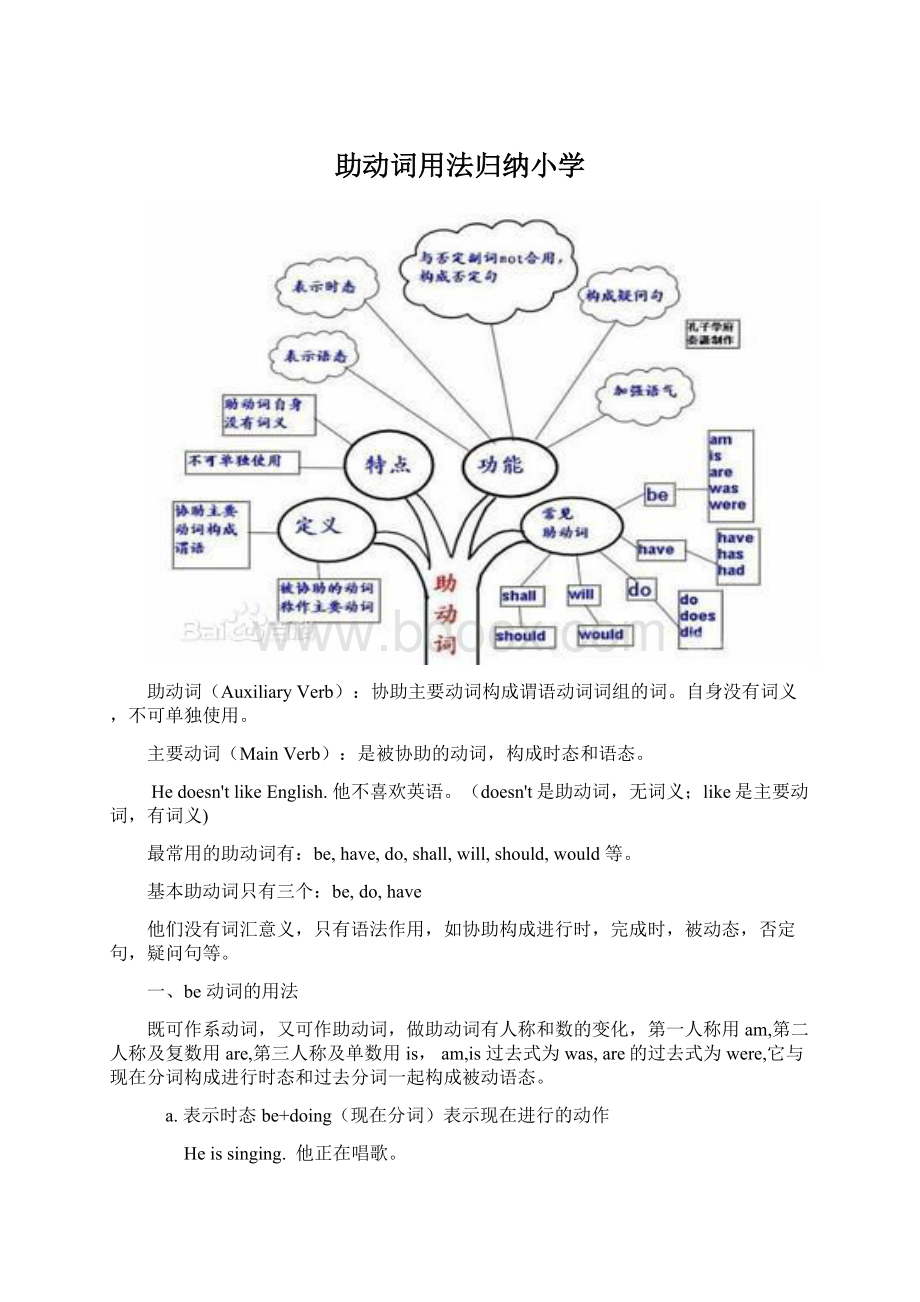助动词用法归纳小学.docx
《助动词用法归纳小学.docx》由会员分享,可在线阅读,更多相关《助动词用法归纳小学.docx(12页珍藏版)》请在冰豆网上搜索。

助动词用法归纳小学
助动词(AuxiliaryVerb):
协助主要动词构成谓语动词词组的词。
自身没有词义,不可单独使用。
主要动词(MainVerb):
是被协助的动词,构成时态和语态。
Hedoesn'tlikeEnglish.他不喜欢英语。
(doesn't是助动词,无词义;like是主要动词,有词义)
最常用的助动词有:
be,have,do,shall,will,should,would等。
基本助动词只有三个:
be,do,have
他们没有词汇意义,只有语法作用,如协助构成进行时,完成时,被动态,否定句,疑问句等。
一、be动词的用法
既可作系动词,又可作助动词,做助动词有人称和数的变化,第一人称用am,第二人称及复数用are,第三人称及单数用is,am,is过去式为was,are的过去式为were,它与现在分词构成进行时态和过去分词一起构成被动语态。
a.表示时态be+doing(现在分词)表示现在进行的动作
Heissinging.他正在唱歌。
b.表示语态be+done(过去分词)表被动语态
HewassenttoEngland.他被派往英国。
c.be+todo(动词不定式)表示计划安排命令。
Wearetoplanttreesnextweek.下周我们将要去植树。
Youaretoexplainthis。
对此你要做出解释。
二、do的用法
Do主要帮助实意动词构成否定和疑问句,后跟动词原形,有时放在实意动词前起强调作用,还可代替前文出现的动词,避免重复。
Do有人称和数的变化,第一、二人称及复数用do,第三人称及单数用does,过去式为did。
1)构成一般疑问句。
DO+主语+动词原形+其他
Ilikesinging变为疑问句为Doyoulikesinging?
2)do+not构成否定句。
主语+do+not+动词原形。
Idonotwanttobecriticized. 我不想挨批评。
Hedoesn'tliketostudy. 他不想学习。
Manystudentsdidn’tknowtheimportanceofEnglishbefore.过去好多学生不知道英语的重要性.
3)构成否定祈使句。
Don'tgothere. 不要去那里。
Don'tbesoabsent-minded. 不要这么心不在焉。
说明:
构成否定祈使句只用do,不用did和does。
4)放在动词原形前,加强该动词的语气。
Docometomybirthdaypartyplease. 请一定来参加我的生日宴会。
Ididgothere. 我确实去那儿了。
Idomissyou. 我确实想你。
我真想你了!
5)用作代替动词。
----DoyoulikeBeijing?
--你喜欢北京吗?
----Yes,Ido. No,Idon’t.--是的,喜欢。
(do用作代动词,代替likeBeijing.)
Heknowshowtodriveacar,doesn'the?
他知道如何开车,对
吧?
三、have的用法
Have+过去分词构成完成时态
Ihavestudiedenglishforalongtime.
情态动词的基本用法归纳
情态动词有can(could),may(might),must,haveto,shall(should,will(would),dare(dared),need(needed),oughtto等。
情态动词无人称和数的变化;不能单独使用,必须与其后的动词原形构成谓语。
一、can,could
1)表示能力
Marycanspeakthreelanguages.
Canyouskate?
此时可用beableto代替。
Can只有一般现在时和一般过去式;而beableto则有更多的时态。
I’llnotbeabletocomethisafternoon.
当表示“经过努力才得以做成功某事”时应用beableto,不能用Can。
如:
Hewasabletogotothepartyyesterdayeveninginspiteoftheheavyrain.
2)表示请求和允许。
-----CanIgonow?
-----Yes,youcan./No,youcan’t.
此时可与may互换。
在疑问句中还可用could,might代替,不是过去式,只是语气更委婉,不能用于肯定句和答语中。
----CouldIcometoseeyoutomorrow?
----Yes,youcan.(No,I’mafraidnot.)
3)表示推测(惊讶、怀疑、不相信的态度),用于疑问句、否定句和感叹句中。
Canthisbetrue?
Thiscan’tbedonebyhim.
Howcanthisbetrue?
二、may,might
1)表示请求和允许。
might比may语气更委婉,而不是过去式。
否定回答时可用can’t或mustn’t,表示“不可以,禁止”。
----Might/MayIsmokeinthisroom?
----No,youmustn’t.
----May/MightItakethisbookoutoftheroom?
----Yes,youcan.(No,youcan’t/mustn’t.)
用MayI...?
征徇对方许可时比较正式和客气,而用CanI...?
在口语中更常见。
2)用于祈使句,表示祝愿。
Mayyousucceed!
3)表示推测、可能性(不用于疑问句)。
might不是过去式,它所表示的可能性比may小。
1.Hemay/mightbeverybusynow.
2.Yourmothermay/mightnotknowthetruth.
三、must,haveto
1)表示必须、必要。
Youmustcomeintime.
在回答引出的问句时,如果是否定的,不能用mustn’t(禁止,不准),而用needn’t,don’thaveto(不必).
----Mustwehandinourexercisebookstoday?
----Yes,youmust.
----No,youdon’thaveto/youneedn’t.
2)must是说话人的主观看法,而haveto则强调客观需要。
Must只有一般现在时,haveto有更多的时态形式。
1.heplayisn’tinteresting,Ireallymustgonow.
2.IhadtoworkwhenIwasyourage.
3)表示推测、可能性(只用于肯定的陈述句)
1.You’reTom’sgoodfriend,soyoumustknowwhathelikesbest.
2.Yourmothermustbewaitingforyounow.
四、shall,should
1)shall+动词原形表示将来时态
Shallwegoshoppingtomorrow?
2)shall用于第一人称,征求对方的意见。
Whatshallwedothisevening?
shall用于第二、三人称,表示说话人给对方的命令、警告、允诺或威胁。
1.Youshallfailifyoudon’tworkhard.(警告)
2.HeshallhavethebookwhenIfinishit.(允诺)
3.Heshallbepunished.(威胁)
六、will,would
1)表示请求、建议等,would更委婉。
Wouldyoulikeacupofcoffee?
你想要一杯咖啡吗?
2)will+动词原形表将来时态
Hewillcomebacknextmonth.他下个月将会回来。
3)表示意志、愿望和决心。
1.Iwillneverdothatagain.
助动词练习题
1把下列句子变为一般疑问句。
1.Itisalovelydog.
________________________________________
2.Sheislovelygirl.
________________________________________
3.Weareclassmates.
______________________________________
4.Iamadoctor.
________________________________________
5.Thereisabirdinthetree.
________________________________
6.Theyaregoodfriends.
____________________________________
7.Ilovemyparents.
_______________________________________
9.Wehaveapleasanthome.
_______________________________
10.TheygotochurchonSunday.
_____________________________
11.Youareasinger.
______________________________
2.用dodoesbe填空
1>_____sheknowalltheanswers?
Yes,she____.No,she_____.
2>_____thetwinsoftenfight?
Yes,_____do.No,_____don’t.
3>_____yourdadlikelisteningtomusic?
Yes,____does.No,_____doesn’t.
5>_____youhaveanewteacher?
Yes,I______.No,I______.
6>_____sheateacher?
Yes,she_____.No,she_____.
10>_____yourfathersmokinginthelivingroom?
Yes,____is.No,he_____.
助动词和情态动词专项练习
一、情态动词的基本用法
⒈CanJohnSmith______hishomeworkontime?
A.finishB.finishesC.finishingD.finished
⒉Shedare______outbyherselfatnight.
A.gonotB.nottogoC.tonotgoD.notgo
⒊You______tothepartytonightifyouhavesomethingimportanttodo.
A.don’tneedcomeB.needn’ttocome
C.needn’tcomeD.don’tneedcoming
⒋—We’llbereadytoleaveateight.
—Well,Johnmust______backbythen.
A.beingB.isC.beD.tobe
⒌Yourgrandmother______thenewspaperwithoutglasses.
A.canstillreadB.cansstillread
C.stillcanreadsD.canstillreads
二、must,need,dare的用法
⒍—MustIgetupearlytomorrow,Dad?
—No,you_____.TomorrowisSunday.
A.can’tB.mustn’tC.needn’tD.couldn’t
⒎—Mustwefinishthebooktoday?
—Yes,you______.
A.canB.mayC.needD.must
⒏You______playontheroad.It’sdangerous.
A.mustn’tB.mayC.canD.must
⒐You______returnthebooknow.Youcankeepituntilnextweek.
A.can’tB.mustn’tC.needn’tD.darenot
⒑I______asleepingbagbecauseI’vealreadygotone.
A.needn’thaveB.didn’thaveC.don’tneedD.neednot
⒒MrSmith______apenfromJack.
A.musttoborrowB.hadborrowed
C.mustborrowedD.hadtoborrow
三、can,could,may,might的用法
⒓Theman____walkfastbecauseheislameintherightfoot.
A.mustB.mustn’tC.canD.can’t
⒔—CouldIborrowyourdictionary?
—Yes,ofcourseyou______.
A.willB.wouldC.mustD.can
⒕Acomputer_____thinkforitself,itmustbetoldwhattodo.
A.mightnotB.maynotC.couldn’tD.can’t
⒖—Thatmustbeamistake.
—Idon’tthinkso.It______amistake.
A.maybenotB.needn’tbeC.cannotbe
⒗He______helpcryingatthenewsofhisfather’sdeath.
A.couldn’tB.shouldn’tC.hadn’tD.didn’t
⒘“Now,______allsmile,please?
”heasked.
A.mayyouB.doyouC.shallyouD.canyou
⒙Ihaven’tbroughtmydictionarywithme._____Iuseyours?
A.MustB.ShallC.MayD.Need
四、should,would,shall,will的用法
⒚—MustIcopythenewwordsinclass?
—No,you______.You______doitathome.
A.needn’t,mayB.mustn’t,must
C.mustn’t,mayD.needn’t,mustn’t
⒛—Wouldyoupleasenotdrawpicturesonthewall?
—Sorry.I______itagain.
A.amnotdoingB.don’tdoC.didn’tdoD.won’tdo
21.______Iopenthewindow?
It’ssowarmhere.
A.ShallB.WillC.WouldD.Must
22.______youlikesomeoranges?
A.WouldB.CanC.MayD.Must
23.Tomsaidthathe______apologizetoMary.
A.wouldB.willC.shallD.isgoingto
24.“Doyouthinkwe______turnback?
”Janeasked.
A.shallB.willC.shouldD.would
⒈He______anyhelp.Hecandoitallbyhimself.
A.needsnotB.needn’t
C.doesn’tneedD.doesn’tneedtoask
⒉LiFangisn’tintheclassroom.He______beatthelibrary.Let’sgoandfindhim.
A.canB.mustC.needD.should
⒊—MayIhavealookatyournewwatch?
—Yes,you______.
A.canB.mustC.needD.should
⒋—MustIhandintheexercisebooktomorrow?
—No,you______.Youcanhanditinthedayaftertomorrow.
A.can’tB.mustn’tC.needn’tD.couldn’t
⒌There______anEnglishtestnextMonday.
A.maybeB.wasC.maybeD.may
⒍You’dbetterasksomeone,oryou______getlost.
A.mayB.mustn’tC.aregoingtoD.can
7.“Comeon!
”Petercalled.“We______stayhereanylonger.”
A.couldn’tB.can’tC.hadn’ttoD.mightn’t
8..MustTomwriteitnow?
No,he______.
A.needn’tB.can’tC.mustD.mustn’t
9.“HaveyouseenLirecently?
”
“No,Ithinkhemust______awayonvacation.”
A.beingB.isC.beD.tobe
10.“Allright.You______ifyoudon’twantto.”
A.don’tneedstayB.needn’tstayC.needn’ttostayD.don’tneedstaying
1:
She ________ to see documentaries(记录片).
A、do wantB、don't wantC、doesn't wantD、not want
2:
Look at that picture on the wall. __________ you like it?
A、DoB、CanC、CouldD、Are
3:
He ________ like pears.
A、doB、isC、doesn'tD、not
4:
—Do you often go to the cinema______ Sunday?
—No, we__________.
A、on, don'tB、on, aren't C、in, doD、in, don't
5:
-Can you see a light on the table?
-Yes, ________.
A、I amB、I’m notC、I canD、He isn’t
6:
—Does the boy want to be an actor?
—________.
A、Yes, he isB、No, he doesC、Yes, he doesD、No, he isn't
7:
_________ he have any apples ?
A、DoB、DoesC、IsD、Are
8:
She ______ want to be a policewoman, because she thinks it’s kind of dangerous.
A、isn’tB、aren’tC、don’tD、doesn’t
9:
Why____he have brown hair?
A、doB、doesC、isD、has
10:
What time__________ he get home every day?
A、isB、doesC、doD、am
11:
What________ you see in the picture?
A、isB、areC、can D、have
12:
Jack_______ like flying kites______ throwing a frisby.
A、don't, orB、doesn't, andC、don't, andD、doesn't, or
13:
A:
________ Jim ________ a ball?
B:
No, he________.
A、Do, have, don'tB、Does, has, doesn'tC、Is, have, isn'tD、Does, have, doesn't
14:
I ________ have a w